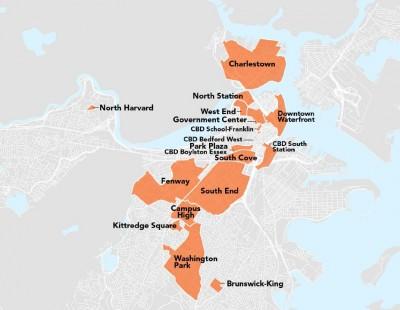The Boston Redevelopment Authority is seeking 10-year extensions for 14 of the 16 Urban Renewal plans that are expiring in areas around the city. Community meetings will be held in the coming weeks to introduce the public to urban renewal tools that are being used currently, according to a March 24 press release.

In January, the Massachusetts Department of Housing and Community Development approved a one-year extension to the active plans, meaning the majority of the plans in Boston are set to expire in April 2016. The request for the longer extension is to continue the goals set by the BRA.
The extension process is expected to last until the end of 2015, as public feedback synthesizes through the public meetings that are scheduled for this summer and fall, the release stated.
Urban Renewal is a federal government-funding program that began with the passing of the Housing Act of 1949 by former U.S. President Harry Truman. The program promotes economic development and creates housing in deteriorating inner cities.
Currently, 18 Urban Renewal plans are active around the city, the release stated. The BRA plans to allow the plans in Allston and a portion of Downtown to expire because the redevelopment objectives have been met.
“Urban Renewal was intended to be a program federally to respond to the need for cities to address plight and shrinking populations and crumbling infrastructure,” said Nick Martin, director of communications for the BRA.
Earlier this month, the BRA’s Board of Directors approved five development proposals that represent $131 million of investment for Boston’s economy. The projects, which are taking place across the city’s neighborhoods, are expected to bring in nearly 500 construction jobs, according to a March 13 press release from the BRA.
“We still think Urban Renewal is a valuable tool in redevelopment of the city and creating vibrancy and accomplishing the goals that not only we and the administrative committee for the development of the city want to bring, but also what the community wants,” Martin said.
With Urban Renewal, the BRA has been able to help with development in zoning controls, housing affordability restrictions and enhancing neighborhoods throughout the city. The goals have been revised to reflect the changing urban environment, including climate change, so the tools used now are more nuanced than they were in the 1950s, Martin said.
The BRA has been able to help the community and major businesses, including Liberty Mutual, through Urban Renewal.
“During the recession, Liberty Mutual was considering moving their headquarters out of Boston, and we were able to use the tools of urban renewal to assemble land in Back Bay, where they could expand their headquarters in the city, and without urban renewal as a tool and power, we wouldn’t have been able to effectuate that development,” Martin said.
There will be three community meetings to present the content to the public and provide residents with an understanding of the goals of the BRA to allow for community engagement.
“There is a real lack of affordable housing in the area, and I know [Boston Mayor Martin Walsh] has been working hard to create more affordable housing in the Boston area,” said Rhonda Siciliano, the New England public affairs officer of the U.S. Department of Housing and Urban Development.
Community participation and awareness is an integral part of the BRA’s urban renewal plan, said Martin. A series of kickoff meetings will start to occur to integrate community awareness and involvement. This is an ongoing plan that will include a series of goals to improve the redevelopment of the city, he said.
“We look forward to facilitating a robust conversation with residents across the city about the future of urban renewal in Boston,” said BRA Director Brian Golden in the release.
Several residents said the Urban Renewal program could only have positive effects for Boston across several platforms including the economy, housing and sustainability.
Megan Wagstaffe, 24, of the South End, said the Urban Renewal initiative can strengthen the economy of the city.
“It will bring more business to the city and make more money and long-term sustainability for the city,” she said.
Mary Petit-Frere, 45, of South Boston, said revitalizing certain areas could help the generally high price of housing in Boston.
“The housing in Boston is expensive,” she said, “and some people can’t afford it, making it a problem for the city.”




















































































































